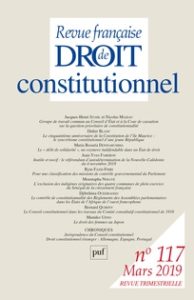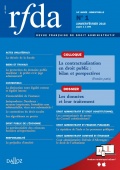Juil 4, 2019
Données bibliographiques / Bibliografische Daten |
|---|
| Auteurs / Autoren: | ULRICH, JACOB; KESSEN, JAN |
|---|
| Source / Fundstelle: | https://www.cambridge.org/core/journals/german-law-journal/article/constitutionstheir-role-through-the-ages-notes-on-the-59th-meeting-of-germanspeaking-public-law-assistants-in-frankfurt-am-main/2536CF87A2C61ABEE23B2AFCE2E7190A |
|---|
| Revue / Zeitschrift: | German Law Journal |
|---|
| Localisation / Standort: | German Law Journal, Volume 20, Issue 5, pp. 748-754 |
|---|
| Catégorie / Kategorie: | Droit constitutionnel |
|---|
| Mots clef / Schlagworte: | Grundgesetz, Droit constitutionnel allemand |
|---|
 Abstract:
Abstract:
Once a year, the German-speaking public law assistants meet to discuss recent developments in their working areas. This year, the anniversary of several enactments of constitutions, such as the Grundgesetz, suggested to discuss issues with regard to the role of constitutions for the democratic state, constitutional change, and the relevance of constitutions for societal cohabitation. During the lively discussions, one could observe a trend towards interdisciplinary research in the work of young public law scholars.
Juin 24, 2019
Données bibliographiques / Bibliografische Daten |
|---|
| Auteurs / Autoren: | HUBERT, JULIANE; GÖRLITZ, FRANZISKA; KUCHER, JASMIN; SCHEFFER, MORITZ; WIESER, PATRICK |
|---|
| Source / Fundstelle: | https://www.cambridge.org/core/journals/german-law-journal/article/tatprovokation-the-legal-issue-of-entrapment-in-germany-and-possible-solutions/964310727F53984D02FB1BB6031289E3 |
|---|
| Revue / Zeitschrift: | German Law Journal |
|---|
| Année / Jahr: | 2019 |
|---|
| Localisation / Standort: | German Law Journal, Volume 20, Issue 4, pp. 496-509 |
|---|
| Catégorie / Kategorie: | Droit pénal, Strafrecht |
|---|
| Mots clef / Schlagworte: | Tatprovokation, Provocation à l'infraction, Provocation à la preuve |
|---|
 Abstract:
Abstract:
Incitement by police officers is a well-known and often utilized police measure in the German investigation process. Yet, when it comes to prosecuting the perpetrators, a moral conflict arises. Should a State, bound by its own constitution and committed to protect its citizens, be allowed to incite or support a possible offender and afterwards judge on his or her wrongful actions? After Germany’s higher courts had to deal with multiple cases of entrapped perpetrators, there has been a strong debate about the admissibility, requirements, and consequences of entrapment within the German legal system. International and national courts as well as scholars represent different legal standpoints in this regard. In particular, the approaches of the European Court of Human Rights and the German Federal Court of Justice differ significantly in their results. As Germany ratified the European Convention on Human Rights and therefore has to adhere to the European Court of Human Rights’ ruling, an additional legal conflict arises. This article depicts and discusses the most relevant approaches to resolve this moral and legal conflict and satisfy both the need for effective prosecution and the procedural rights of the individual person subject to the act of entrapment. Additionally, recent legislative ambitions are presented.
Mar 13, 2019
 Abstract
Abstract:
People of Turkish ethnicity constitute Germany’s largest immigrant group but only a small percentage have naturalized as German citizens. This article explores the historical foundation of Turkish migration to Germany and the legislative attempts made by both Germany and Turkey to accommodate these people with one foot in each country. It argues that only by abandoning its long-held prejudice against dual citizenship can Germany increase the naturalization rate of all foreigners in its country, not just those from Turkey.
Mar 1, 2019
Données bibliographiques / Bibliografische Daten |
|---|
| Auteurs / Autoren: | LEPSIUS, OLIVER; DREIER, HORST; MÖLLERS, CHRISTOPH; KUCH, DAVID; GAILLET AURORE |
|---|
| Revue / Zeitschrift: | Revue française de droit constitutionnel, 2019/1, p. 199-213 |
|---|
| Année / Jahr: | 2019 |
|---|
| Localisation / Standort: | Revue française de droit constitutionnel |
|---|
| Catégorie / Kategorie: | Droit comparé, Droit constitutionnel, Droit électoral, droit politique, Procédure constitutionnelle |
|---|

Résumé de l'auteur:
La richesse de la comparaison franco-allemande a nourri de longue date les chroniques de droit constitutionnel comparé. La seule mention des spécificités du fédéralisme allemand face au caractère centralisé de l’État français, des conceptions différentes de l’État, de la place du droit, dans ses rapports avec la politique, la démocratie et la doctrine ou encore du rôle des juges, notamment constitutionnels, suffit à esquisser la variété des horizons à approfondir à cet égard. Le contexte des célébrations respectives des soixante-dixième et soixantième anniversaires de la Loi fondamentale allemande de 1949 et de la Constitution de la V
e République de 1958 constitue sans conteste une nouvelle occasion de mettre en perspective ce qui peut rapprocher ou distinguer les deux ordres constitutionnels actuels.
En France comme en Allemagne, les élections de 2017 – présidentielle et législatives en France, législatives en Allemagne – ont bousculé les institutions. Afin de saisir au plus près les défis d’envergure posés au système allemand depuis les élections du 24 septembre 2017, cette chronique a été ouverte à trois auteurs allemands. Ils ont ce faisant été libres de proposer leur regard de spécialistes sur les évolutions marquantes du droit constitutionnel en 2017-2018.
Traduction par Aurore Gaillet.
Jan 14, 2019
Données bibliographiques / Bibliografische Daten |
|---|
| Auteurs / Autoren: | KORDEVA, MARIA; COSSALTER, PHILIPPE |
|---|
| Source / Fundstelle: | RFDA, n°6 2018, p. 1016 - 1020 |
|---|
| Revue / Zeitschrift: | Revue Française de Droit Administratif |
|---|
| Année / Jahr: | 2018 |
|---|
| Catégorie / Kategorie: | Droit administratif, Droit constitutionnel |
|---|
| Mots clef / Schlagworte: | GOUVERNEMENT, POUVOIR |
|---|
 Introduction de l'article :
Introduction de l'article :
La Constitution de la République fédérale d’Allemagne et les constitutions des États fédérés allemands (Länder) règlent de manière différente les rapports entre le parlement nouvellement élu et un gouvernement sortant. Il existe de nombreux cas de figure.
La Loi fondamentale du 23 mai 1949 (art. 69, al. 2 et 3), la Constitution de Bade-Wurtemberg, la Constitution de Rhénanie du Nord-Westphalie (art. 62, al. 2) et la Constitution de Sarre (art. 87, al. 3, première phrase) disposent que les fonctions du chef du gouvernement ne se terminent qu’avec le début de la législature. Par les élections, qui donnent la composition d’un nouveau Parlement, s’achève le mandat du chef du gouvernement qui n’est plus considéré comme « titulaire de la fonction » (
Amtsinhaber)
. La Constitution de Bavière (art. 44) introduit la notion de durée du gouvernement, celle de Brême ouvre la possibilité d’élire un chef du gouvernement pour la durée d’une législature (art. 107, al. 2), tandis que les Constitutions de Hesse (art. 113, al. 2) et de Basse-Saxe (art. 24, al. 2) optent pour la démission du Premier-ministre déclenchée par l’entrée en fonction du nouveau Parlement (
Landtag), ce qui signifie que l’ouverture de la nouvelle législature n’agit pas comme une « perte de la fonction » (
Amtsverlust) mais convient d’être perçue comme entraînant une obligation constitutionnelle concrète : la démission. Les textes constitutionnels de Berlin (art. 41, al. 1
er), Hambourg (art. 34), Rhénanie-Palatinat (art. 98, al. 2) et Schleswig-Holstein (art. 21, al. 2) ne prévoient ni une obligation de démission incombant au Premier-ministre après le début de la nouvelle législature, ni ne contiennent des dispositions précises relative à la durée d’exercice des fonctions gouvernementales. Il s’agit d’une tradition provenant des textes constitutionnels de
Länder de l’époque weimarienne.
Plan de l'article :
- Signification de l'article 69, alinéa 3, LF : commodité constitutionnelle ou difficulté organisationnelle
- La raison pratique de l'existence d'une disposition constitutionnelle prévoyant la fin des fonctions du gouvernement fédéral
- Les modalités de composition du gouvernement intérimaire
- L'illusoire plénitude des compétences constitutionnelles du gouvernement intérimaire agissant dans le cadre de l'article 69, alinéa 3, LF
- Les compétences constitutionnelles du gouvernement intérimaire
- Les limites dans l'exercice des compétences du gouvernement intérimaire

 Abstract:
Once a year, the German-speaking public law assistants meet to discuss recent developments in their working areas. This year, the anniversary of several enactments of constitutions, such as the Grundgesetz, suggested to discuss issues with regard to the role of constitutions for the democratic state, constitutional change, and the relevance of constitutions for societal cohabitation. During the lively discussions, one could observe a trend towards interdisciplinary research in the work of young public law scholars.
Abstract:
Once a year, the German-speaking public law assistants meet to discuss recent developments in their working areas. This year, the anniversary of several enactments of constitutions, such as the Grundgesetz, suggested to discuss issues with regard to the role of constitutions for the democratic state, constitutional change, and the relevance of constitutions for societal cohabitation. During the lively discussions, one could observe a trend towards interdisciplinary research in the work of young public law scholars.


